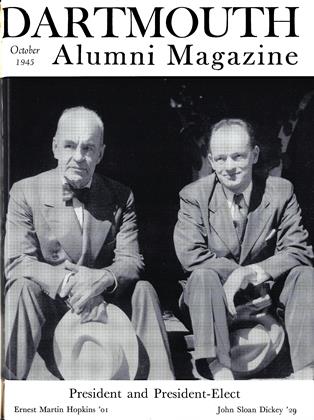The last in the series of biographical sketches of members of the Dartmouth Board of Trustees follows:
FROM 1940 UNTIL his recent resignation, a job of hemispheric scope has been directed for the United States government by Dartmouth's youngest Alumni Trustee, Nelson A. Rockefeller '30, who was elected to the Board in 1942.
Under three different titles and with increasing authority, Mr. Rockefeller for five years has been helping develop good will among the Americas, North, South and Central, "in the interests of hemispheric solidarity."
His first government post, to which he was appointed by President Roosevelt, was Coordinator of Commercial and Cultural Relations Between the American Republics for the National Defense Advisory Council, and Chairman of the Interdepartmental Committee on Inter-American Affairs;, To accept this dollar-a-year appointment, Mr. Rockefeller arranged a leave of absence from his position as president of Rockefeller Center, Inc., in which he managed the many activities of the great New York civic center which his father had built.
In July 1941 the name of the Office was changed to the Office of the Coordinator of Inter-American Affairs. Later that same year, Mr. Rockefeller was appointed a member of the Economic Defense Board by Vice President Wallace, its chairman, and was the only non-Cabinet member serving on it. He was moved up in 1944 to the post of Assistant Secretary of State in Charge of Relations with the American Republics.
Dartmouth, itself, has contributed a drop in the gigantic bucket of good will dispensed by Mr. Rockefeller through the dual channels of psychology (Press, Radio, Motion Pictures, Social Science and Education) and economics (Commodities, Transportation, Development, Finance and Export). It has conducted conferences on inter-American relations and at the request of the Coordinator's office has sent pictures of its buildings to be exhibited with those of other U. S. colleges in South America.
Mr. Rockefeller's knowledge of South and Central America grew from his visits there as a Spanish speaking business man. He was a director of Creole Petroleum Corp. which has large interests in Venezuela. As president of New York's Museum of Modern Art, of which his mother was one of the founders, he also became widely acquainted with the cultural life of the other Americas through arranging for exhibits of their artists' works in the Museum.
The second of the five sons of Mr. and Mrs. John D. Rockefeller Jr. and grandson of John D. Rockefeller, Nelson Rockefeller was born at Bar Harbor, Me., on July 8, 1908. At Dartmouth, which he entered from the progressive Lincoln School of Teachers College, he was a member of Palaeopitus, Green Key, Casque and Gauntlet, Psi Upsilon, Delta Omicron Gamma, Cabin and Trail, president of The Arts, editor in chief of the Pictorial, and vice president of the class in his sophomore year. Graduating Phi Beta Kappa in 1930, he was married shortly after to Mary Todhunter Clark of Cynwyd, Pa. They have five children: Rodman, Ann, Steven, and the twins, Michael and Mary.
Following a trip around the world and an apprenticeship in the family real estate holdings in Ohio, he joined the Rockefeller Center organization, becoming president in 1938.
Mr. Rockefeller is a trustee of the Metropolitan Museum of Art, as well as president of the New York Museum of Modern Art. He was elected to the Phi Beta Kappa Associates in 1943, holds an honorary LL.D. from Fordham University, is vice president of the Westchester County Board of Health, member of the New York State Chamber of Commerce, of the Dartmouth College Club of New York and various clubs in New York and Washington.
 View Full Issue
View Full Issue
More From This Issue
-
 Article
ArticleHARRY L. HILLMAN
October 1945 By SIDNEY C HAZELTON '09, -
 Article
ArticleDARTMOUTH'S NEW LEADER
October 1945 -
 Article
ArticleLaureled Sons of Dartmouth
October 1945 By H. F. W. -
 Class Notes
Class Notes1918
October 1945 By ERNEST H. EARLEY, DONALD L. BARR -
 Class Notes
Class Notes1917
October 1945 By MOTT D. BROWN, DONALD BROOKS -
 Sports
SportsTHE FOOTBALL OUTLOOK
October 1945 By Francis E Merrill '26







